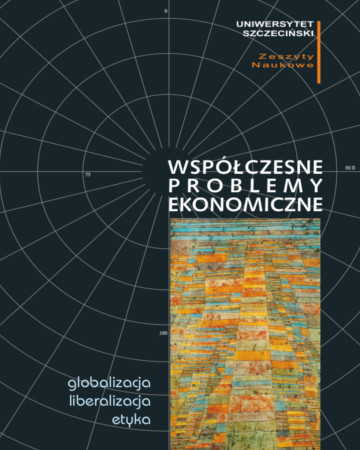
ISSN: 2081-9579
eISSN: 2353-2815
OAI
DOI: 10.18276/wpe.2015.11-06


Issue archive /
nr 11 (2015)
Sytuacja wykwalifikowanych i niewykwalifikowanych pracowników w warunkach offshoringu
(Offshoring and its impact on high skilled and low skilled employees)
| Authors: |
Paula
Reczek
Wydział Ekonomii i Zarządzania Akademii Leona Koźmińskiego w Warszawie. |
| Keywords: | offshoring outsourcing low skilled employees high skilled employees |
| Data publikacji całości: | 2015 |
| Page range: | 11 (67-77) |
Abstract
Globalization’ has been changing the situation in the labour market. One of the aspects of this phenomenon is offshoring, which is the movement of the business process or its part abroad. There are controversies about the impact of offshoring on the labour market, especially in the developed countries, where people feel uncertainty about their jobs. There is a number of studies on globalization, and there are articles warning people against losing their jobs. On the contrary there are deficiencies in the existing research on how offshoring influences work and income distribution, which is the main topic of this work. The objective of this article it to show who wins and who loses in the labour market in offshoring. The first section of this article covers the main definitions, the difference between offshoring and outsourcing and the reasons why these phenomena have been increasing in the last decades. The second section is dedicated to indicate demographic tendencies in the global labour market. The last part will cover the review of the latest literature to show how differently offshoring impacts skilled and unskilled employees.
Download file
Article file
Bibliography
| 1. | Bank Światowy, http://data.worldbank.org/indicator/SI.POV.GINI. |
| 2. | Blinder A., How Many U.S. Jobs Might Be Offshorable?, „CEPS Working Paper” 2007, no. 142, http://www.princeton.edu/ceps/workingpapers/142blinder.pdf. |
| 3. | Burstein A., Vogel J., Globalization, Technology, and the Skill Premium: A Quantitative Analysis, „NBER Working Paper” 2010, no. 16459, http://www.nber.org/papers/w16459. |
| 4. | Dornbusch R., Fischer S., Samuelson P., Heckscher-Ohlin Trade Theory with a Continuum of Goods, „Quarterly Journal of Economics” 1980, vol. 95, no. 2, http://www.hec.unil.ch/ocadot/ATdocs/papers/dornbusch.pdf. |
| 5. | Feenstra R., Advanced International Trade: Theory and Evidence, Davis, and National Bureau of Economic Research, University of California 2002, http://phamtrung.wikispaces.com/file/view/Advanced+International+Trade+Theory+and+Evidence.pdf. |
| 6. | Feenstra R., Offshoring in the Global Economy: Microeconomic Structure and Macroeconomic Implications, MIT Press, Cambridge, Massachusetts–London 2010. |
| 7. | Friedman T.L., Świat jest płaski. Krótka historia XXI wieku, Rebis, Poznań 2006. |
| 8. | Gay Ch.L., Outsourcing strategiczny: koncepcja, modele i wdrażanie, Oficyna Ekonomiczna, Kraków 2002. |
| 9. | Grossmana G., Rossi-Hansberg E., Trading Tasks: A Simple Theory of Offshoring, „American Economic Review” 208, vol. 98, no. 5, http://www.princeton.edu/~erossi/TT.pdf?referer=http%3A%2F%2Fscholar.google.pl%2Fscholar%3Fhl%3Dpl%26q%3DGene%2BGrossman%2B%25282008%2529%26btnG%3D%26lr%3D#search=%22Gene%20Grossman%20%282008%29%22. |
| 10. | Hanson G., Harrison A., Trade Liberalization and Wage Inequality in Mexico, „Industrial and Labor Relations Review” 1999, vol. 52, no. 2, http://www.jstor.org/stable/2525166. |
| 11. | ILO (Światowa Organizacja Pracy), http://laborsta.ilo.org/applv8/data/EAPEP/eapep_E.html. |
| 12. | IMF, World Economic Outlook, Spillovers and Cycles in the Global Economy, April 2007, Chapter 5: The Globalization of Labor. |
| 13. | Oczkowska R., Offshoring jako szansa wykorzystania globalnych zasobów kapitału ludzkiego, www.ur.edu.pl/file/21659/15.pdf. |
| 14. | OECD, Education Indicators in Focus, May 2012. |
| 15. | Rajan R., Offshoring, Unemployment, and Welfare with Risk Averse Workers, Current Draft, University of California – Irvine 2013, http://www.economics.uci.edu/~pranjan/papers/offshoring_policy.pdf. |
| 16. | Reczek P., Podział pracy i dochodu w warunkach offshoringu, w: Nowe nurty w zarządzaniu i w ekonomii, red. C. Szmidt, Poltext, Warszawa 2014. |
| 17. | Stiglitz J., Globalizacja, Wydawnictwo Naukowe PWN, Warszawa 2007. |
| 18. | Stolper W., Samuelson P., Protection and Real Wages, „The Review of Economic Studies” 1941, vol. 9, no. 1, http://www.sba.muohio.edu/dunlevja/Course%20Links/EC441/stolper_samuelson.pdf. |
| 19. | Tomkiewicz J., Income Inequality and the Current Phase of Globalization, referat wygłoszony podczas konferencji naukowej „Zarządzanie i polityka gospodarcza dla rozwoju” zorganizowanej przez TIGER na Akademii Leona Koźmińskiego w Warszawie 10–11 października 2013. |
| 20. | Trocki M., Outsourcing. Metoda restrukturyzacji działalności gospodarczej, Wydawnictwo Naukowe PWN, Warszawa 2001. |
| 21. | „The Economist” 2013, Special Report: Offshore Finance, February. |
| 22. | UN, Population Prospects: The 2004 Revision Population Database. |
| 23. | UNCTAD, http://www.unic.un.org.pl/wir/wir2004_offshoring.php. |
| 24. | UNCTAD, World Investment Report. Non-equity Modes of International Production and Development, Geneva 2011, http://unctad.org/en/PublicationsLibrary/wir2011_en.pdf. |
| 25. | Winkler D., Service Offshoring and Its Impact on the Labour Market. Theorretical Insights, Empirical Evidence, and Economic Policy Recommendations for Germany, Physica-Verlag A Springer Company, Berlin–Heidelberg 2009. |